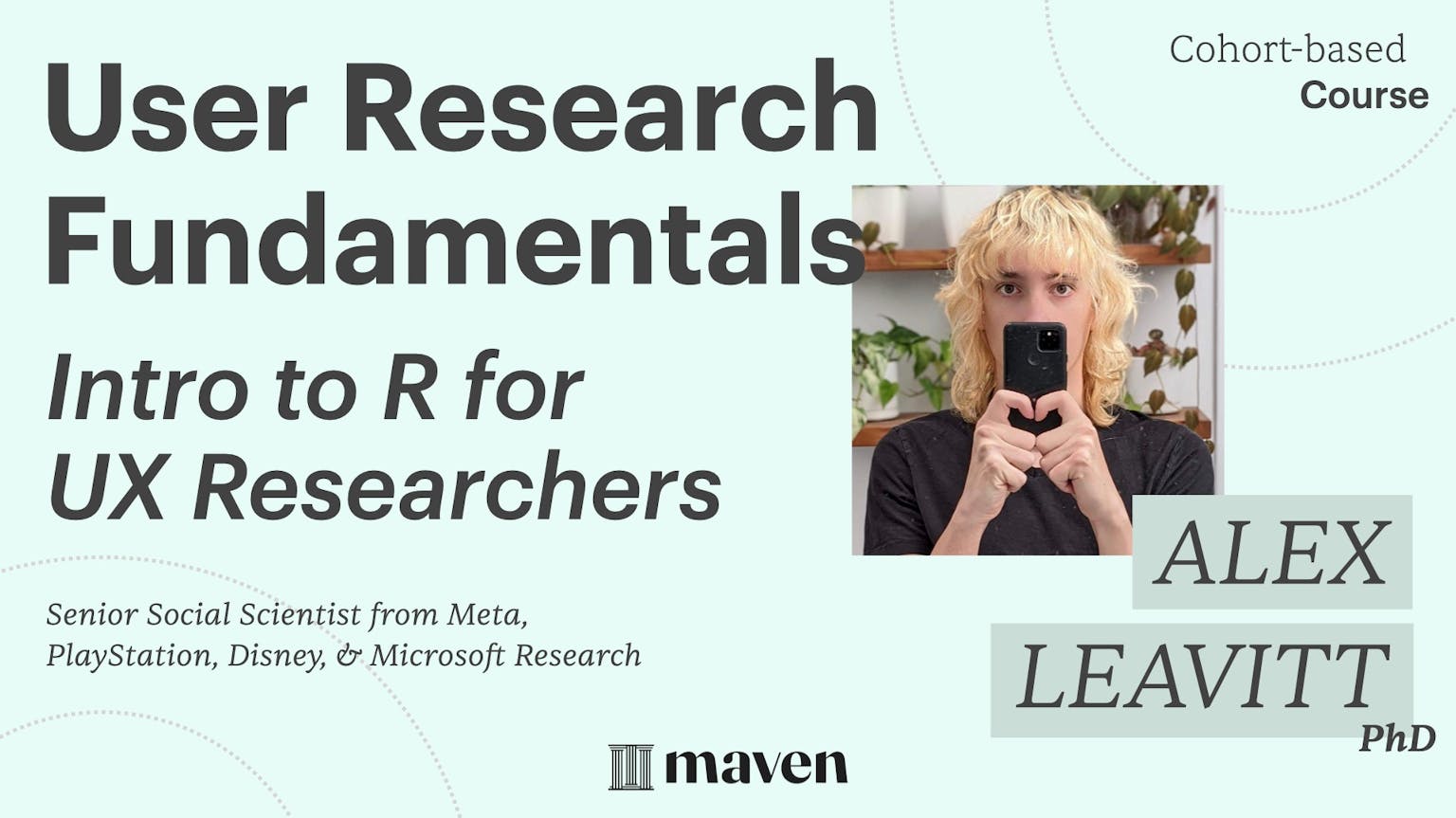Intro to R for UX Researchers
4 Days
·Cohort-based Course
In less than a week, level up your UX Research data analysis toolkit by mastering coding in R!
Intro to R for UX Researchers
4 Days
·Cohort-based Course
In less than a week, level up your UX Research data analysis toolkit by mastering coding in R!
Course overview
Learn the fundamentals of coding in R to improve data analysis for UX Research
This three-day course is your chance to expand your data analysis toolkit and master statistical analysis, visualization, and storytelling techniques for UX Research with the R programming language.
There are ZERO prerequisites (besides installing a bit of software), and the class is available for anyone to join, from junior to senior researchers, as well as non-researchers like PMs, designers, data scientists, etc.
"Intro to R" takes place over a 10-hour curriculum: three 3-hour days, plus one 1-hour optional first orientation day. There are two planned schedules for this course: one during the week, and one across weekends. If the timing of available classes does not fit your calendar, keep an eye out for future cohorts and their respective timing.
Intro to R is part of the User Research Fundamentals curriculum, a course series covering qualitative and quantitative UX Research methods, as well as strategic and foundational UX Research topics. Please fill out a brief survey of your interest in additional courses here: https://maven.com/forms/a713e4
Who is this course for
01
Junior & Senior Quantitative UX Researchers
Master coding in R to level up your quantitative analysis toolkit and move beyond SPSS or STATA
02
Mixed Methods & Qualitative UX Researchers
Improve your research expertise with R programming and learn to collaborate with quants
03
Non-UXRs (PMs, Data Scientists, et al.)
Expand your collaborative potential with basic data analysis skills to apply to product & strategy
What you’ll get out of this course
Improve your data analysis tookit
Learning the basics of R and level up from Excel, STATA, SPSS, or other data analysis programs
Discover how to apply R to UX Research
Apply your research mindset to data analysis of surveys, usability studies, content labeling exercises, and text documents
Gain key skills in data analysis & visualization
Adapt your storytelling techniques with new frameworks for data summarization, visualization, and storytelling
What people are saying
Dina Dajani
Niki Ramchandani
Saeideh Bakhshi
Kate Zyskowski
Anne Kaduk
Andre L Souza
Apala Sabde
Meet your instructor
Alex Leavitt, PhD (they/them)
Alex Leavitt, PhD (they/them)
UX Research Expert
Alex is a global leader and expert in UX Research, particularly for Trust & Safety topics in the social media and emerging technology industries.
After 7 years at Meta leading mixed-methods research spanning massive global surveys, complex experiments, and in-depth qualitative fieldwork, Alex is bringing lessons and insights from Big Tech back out to the public to help you improve your research prowess, confidence, and skills.
Alex holds a PhD in Communication from the Annenberg School for Communication & Journalism at the University of Southern California.
Learn more about their work at http://linkedin.com/in/alexleavitt
Course syllabus
4 live sessions • 4 projects
Week 1
Feb
13
Day 0 [Optional]
Feb
14
Day 1 [Required]
Feb
15
Day 2 [Required]
Feb
16
Day 3 [Required]
Day 0
Day 1
Day 2
Day 3
Be the first to know about upcoming cohorts
Intro to R for UX Researchers
Course Schedule
10 hours in 1 week
Day 0: Monday [Optional]
9pm-10am PST
Day 1: Tuesday [Required]
9am-12pm PST
Day 2: Wednesday [Required]
9am-12pm PST
Day 3: Thursday [Required]
9am-12pm PST
Frequently Asked Questions
Stay in the loop
Sign up to be the first to know about course updates.
Be the first to know about upcoming cohorts
